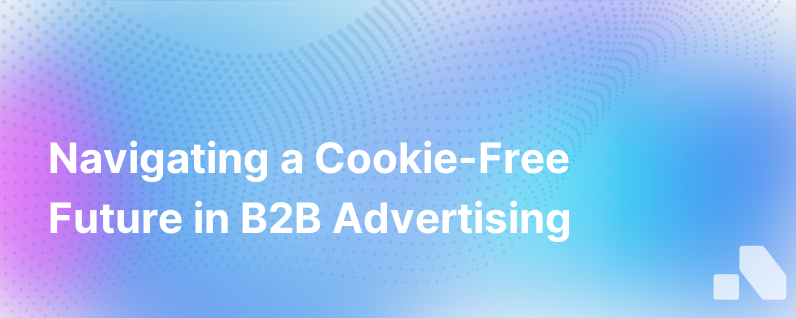Delivering A Cookie Free Future For B2B Advertisers
Published on September 26, 2023 by Sawyer Middeleer
In the shifting sands of digital advertising, there's a seismic change looming on the horizon that is poised to reshape the landscape for B2B advertisers: the end of third-party cookies. With data privacy taking center stage and users demanding greater control over their personal information, web browsers are phasing out third-party cookies, those small data files used to track users across the web.
For B2B advertisers reliant on these cookies for targeting ads, measuring performance, and enhancing customer experiences, adapting to a cookieless future is not just a recommendation; it's a mandate. Let's explore this brave new world and discuss how B2B advertisers can not only survive but thrive in a post-cookie era.
Understanding the End of Third-Party Cookies
Third-party cookies have been the backbone of digital advertising, facilitating everything from behavioral targeting to retargeting ads for prospects that visited your site. But their invasive nature has raised privacy concerns, prompting tech companies to take action. Google has announced plans to end support for third-party cookies in Chrome by 2023, following the lead of browsers like Safari and Firefox.
Why Cookies Are Crumbling
The primary reason for the phase-out is privacy. Regulatory acts like GDPR in Europe and CCPA in California have challenged the collection and sharing of user data. There's a rising demand for more ethical and transparent data practices.
Impact on B2B Advertising
B2B advertisers have traditionally used third-party data for specific targeting across the vast digital landscape. With the disappearance of cookies, there will be a loss of insight into user behavior, making it difficult to execute precision targeting and personalization strategies at scale.
Reimagining B2B Advertising in a Cookie-Free Future
The deprecation of third-party cookies isn't necessarily a death knell for B2B digital advertising but a call to evolve. B2B marketers must pivot their strategies to adapt to this new reality.
Embracing First-Party Data
The strongest asset in a cookie-free future lies in first-party data, the information collected directly from your audience through owned channels. By focusing on first-party data collection strategies, B2B marketers can gather more relevant, proprietary insights into their audience. This includes optimizing websites to enhance user engagement, leveraging CRM data, and encouraging newsletter sign-ups for data-driven insights and segmentation.
Contextual Advertising's Comeback
As targeted ads wane, contextual advertising is making a comeback. By placing ads in relevant digital environments, B2B advertisers can align with content that resonates with their target demographics. This approach mirrors the traditional ways of advertising but is enhanced with sophisticated technology that understands content semantics and user intent, ensuring ads are displayed in the most relevant context.
The Rise of Account-Based Marketing (ABM)
ABM is a focused growth strategy where marketing and sales collaborate to create personalized buying experiences for a mutually identified set of high-value accounts. With the demise of cookies, ABM's importance is amplified, pushing B2B companies to handpick the accounts they want to target and tailor campaigns precisely to these prospects using first-party data and insights.
Investing in Privacy-First Advertising Technologies
In preparation for a post-cookie world, new technologies emphasize user privacy while still providing valuable data to advertisers. Privacy preservation techniques, such as differential privacy and federated learning, are examples of how user data might be aggregated and anonymized to safeguard individuals' privacy while still uncovering insightful trends.
Building and Nurturing Direct Relationships
Without relying on third-party cookies, B2B advertisers need to emphasize building direct relationships with their audience. Offering educational content, webinars, and virtual events can engage prospects in a meaningful conversation, laying the groundwork for a consent-based data exchange.
Leveraging Predictive Analytics
By employing machine learning models, you can analyze first-party data to predict future behaviors, needs, and trends. Predictive analytics helps identify promising leads and guide them through the customer journey more effectively by forecasting their actions and preferences.
Collaborating with Publishers for Cohort-Based Targeting
Google's proposed Privacy Sandbox includes the concept of FLoC (Federated Learning of Cohorts), which could replace individual tracking with cohort-based targeting. By working directly with publishers and leveraging these privacy-first tools, advertisers can still connect their messages with groups sharing common behaviors and interests.
Strategic Partnerships and Data Collaboratives
Forming partnerships and joining data collaboratives can broaden access to valuable data in a responsible way. By allying with companies that have mutual interests or complementary offerings, B2B advertisers can exchange insights within privacy guidelines to enhance targeting capabilities.
Unlocking Opportunities Amidst Challenges
Though the loss of third-party cookies seems daunting, it also opens the door to innovation and could ultimately lead to more authentic and valuable customer interactions. Here are a few key takeaways for B2B advertisers:
- Increase investment in collecting and analyzing first-party data.
- Enhance direct customer engagement to build trust and collect consensual data.
- Revisit and utilize contextual advertising strategies.
- Double down on ABM for targeted, impactful marketing.
- Embrace new technologies that prioritize privacy and user consent.
Final Thoughts
As the cookie crumbles, B2B advertisers must bake a new recipe for success by focusing on transparency, relevance, and value-driven approaches. This transition period is an opportunity for B2B companies to become more sophisticated in understanding and engaging their audience without compromising on privacy.
The cookie-free future promises to reshape B2B advertising into a more ethical and potentially more effective landscape. Advertisers who adapt early, focus on consumer consent, and develop robust first-party data strategies will find themselves well-positioned to lead in this new era.